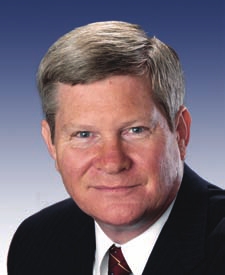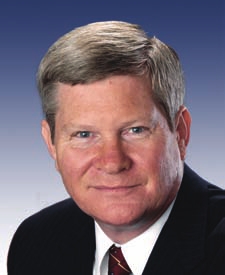 Sen. Tim JohnsonSouth Dakota Sen. Tim Johnson (D), listed as one of our fence-sitters on climate legislation, seems to be taking more of a strident stance in favor of passing a bill this year.
Sen. Tim JohnsonSouth Dakota Sen. Tim Johnson (D), listed as one of our fence-sitters on climate legislation, seems to be taking more of a strident stance in favor of passing a bill this year.
In a column he recently penned and posted on his Senate website, Johnson argues that the climate change bill “could bring jobs, prosperity and clean air” to the country and his wind-swept state of South Dakota.
“Soon the Senate will consider climate change legislation that could finally help South Dakota to live up to its wind generating potential and capture the benefits of a cash crop that is just blowing across our landscape,” wrote Johnson. “In fact, the wind energy potential in South Dakota can put us in a leading position to reduce our nation’s dependence on foreign sources of fossil fuels and get America running on clean energy.”
“This is a chance to invest in American ingenuity and help our country become a global leader on clean energy that can jumpstart our economy,” he continued.
Here’s the full column:
Climate Change Bill Could Bring Jobs, Prosperity and Clean Air
By U.S. Senator Tim Johnson (D-SD)How many times have you heard experts cite the fact that South Dakota is the fourth windiest state, but only ranks 20th in actual installed wind energy generation? Soon the Senate will consider climate change legislation that could finally help South Dakota to live up to its wind generating potential and capture the benefits of a cash crop that is just blowing across our landscape.
In fact, the wind energy potential in South Dakota can put us in a leading position to reduce our nation’s dependence on foreign sources of fossil fuels and get America running on clean energy.
This is a chance to invest in American ingenuity and help our country become a global leader on clean energy that can jumpstart our economy. We can grow our economy and reduce the demand for oil, much of which is imported and drives up our trade deficit while enriching hostile foreign governments.
South Dakota’s growing clean energy economy has added good-paying jobs at an annual job growth rate of 7.9 percent over the past decade. A new federal policy that drives demand for wind power will sustain these jobs and create more of them.
As a consequence of the forward-looking 2007 Energy Bill that boosted renewable fuels production and reformed fuel efficiency rules for cars and trucks, our consumption of petroleum-based gasoline is predicted to decline by over 1 million barrels per day below the country’s daily total in 2007. In addition, it helps pick up the pace on ethanol and looks at next generation biofuels, such as switchgrass, wood waste and other non-grain feedstocks, which helps both East and West River, South Dakota. It also included a tax credit that, in our neck of the woods, can help build wind turbines and start harnessing that energy potential.
Simply put, that means we already have a plan in place that moves us toward consuming less oil and more homegrown biofuels while making our cars and trucks more energy efficient. But that is just one step. When it comes to energy, we should be open to new ideas that help our economy and invest in America.
Now some will throw their hands up and say we just can’t do this now or they will try to cite worst case scenarios and cost projections far beyond what the non-partisan groups have told us clean energy incentives will actually cost. These scare tactics just present a status quo approach that leaves us all vulnerable to oil spikes in a global market and high gas prices that crush family budgets like we saw last summer.
Energy prices are going up with or without any comprehensive policy changes from Congress. The question is: are we sending more of our hard earned money to Big Oil and oil rich countries or are we investing in our own backyards?
Technology and alternative ways to produce energy need long-term planning. For South Dakota in particular, with so much untapped potential for wind energy generation and renewable fuels production, a more progressive national energy policy could be just the step that will finally transform that economic potential into actual jobs, economic development, and opportunity for people and communities across our state.
This fall, the Senate is likely going to take a fresh look at a comprehensive energy bill focused on clean energy incentives. I am optimistic we can turn energy potential into reality and help create new job opportunities at home by producing more clean energy in the United States.



